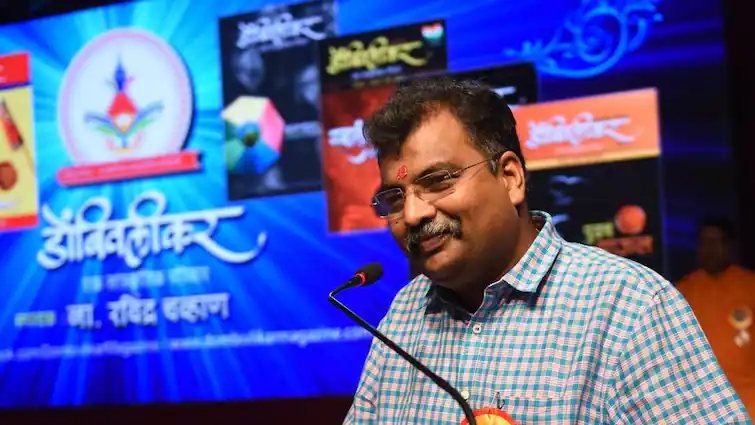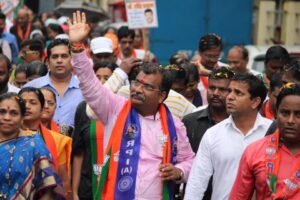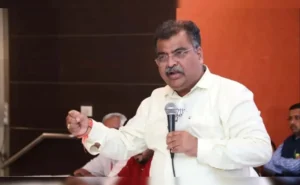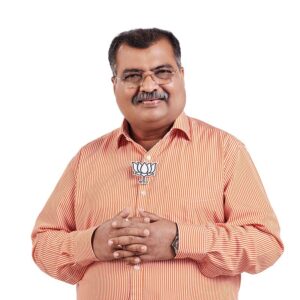In an age where history often competes with headlines, revisiting the lives of India’s real heroes becomes all the more significant. One such deeply respected figure in India’s freedom struggle is Swatantryaveer Vinayak Damodar Savarkar—a revolutionary, reformist, and nationalist whose legacy continues to inspire generations. During his recent visit to the historic Savarkar Wada in Bhagur, Nashik, senior BJP Maharashtra State President Ravindra Chavan shared his moving experience, calling Savarkar “our God” and emphasizing that the more one learns about Savarkar, the deeper their devotion becomes.
“Swatantryaveer Savarkar is our idol. The more we try to learn about him, the more our faith and devotion towards him grow,” Chavan expressed with heartfelt sincerity after his visit.
A Pilgrimage to Bhagur: More Than Just a Visit
Bhagur, a quaint town near Nashik, is not just another name on India’s map. It holds the essence of one of the most intellectually powerful minds of India’s freedom movement—Veer Savarkar. The Savarkar Wada, his ancestral home, has now become a living museum that encapsulates the spirit of a man who was far ahead of his time.
Ravindra Chavan, known for his grounded public presence and commitment to cultural values, described his visit as transformative. He noted that while books may tell you the facts, walking through the very rooms where young Savarkar dreamed of a free India instills a profound sense of respect and connection.
“Many may have read about Savarkar in books, but if one truly wants to understand his life and character, then everyone must visit Savarkar Wada!”
Savarkar: A Life That Defies Labels
Swatantryaveer Savarkar was a poet, political thinker, social reformer, and relentless fighter for India’s independence. Born in 1883, his ideas were revolutionary—not just in the political sense, but also in terms of societal reform. He advocated for the abolition of caste discrimination, promoted scientific thinking, and inspired a vision of India that was modern yet rooted in cultural pride.
During his incarceration at the Cellular Jail in the Andaman Islands, he composed poetry, wrote political treatises, and continued to inspire his fellow prisoners. For leaders like Ravindra Chavan and millions of others, Savarkar’s endurance in solitary confinement for 11 years symbolizes unmatched mental and emotional strength.
Ravindra Chavan: A Leader Rooted in Ideological Reverence
For BJP Maharashtra President Ravindra Chavan, Savarkar is more than a historical figure. He represents a way of life—brave, intellectual, fearless, and selfless. Chavan’s admiration goes beyond ceremonial speeches. His visit to Savarkar Wada was a deeply personal journey.
As someone who has long supported ideological clarity and nationalistic pride, Chavan’s respect for Savarkar fits seamlessly with the BJP’s larger emphasis on honoring India’s freedom fighters and cultural icons who didn’t always get their due in mainstream historical narratives.
BJP’s Cultural Alignment with Savarkar’s Legacy
The Bharatiya Janata Party (BJP) has always championed Savarkar’s contribution to the freedom struggle and his vision for an empowered India. Leaders across the party have highlighted Savarkar’s foresight—his advocacy for Hindutva, his belief in a militarized and united India, and his calls for cultural rejuvenation long before Independence.
By consistently bringing attention to figures like Savarkar, the BJP has sought to rewrite the history of Indian nationalism by including those voices that were once marginalized. Ravindra Chavan’s public reverence for Savarkar further amplifies this alignment and helps preserve his teachings for the younger generation.
Savarkar Wada: A Portal to the Past
Walking through Savarkar Wada, one doesn’t just see old furniture or yellowing walls. One sees the early spark of rebellion that would eventually lead to a movement. Visitors witness relics of the young Vinayak Damodar Savarkar’s life—his writings, personal belongings, photographs, and spaces that breathe life into historical tales.
For a political leader like Ravindra Chavan, whose work is grounded in both policy and public engagement, the visit becomes more than symbolic. It becomes a renewal of purpose, an affirmation of values, and a humble acknowledgment of the sacrifices that made present-day India possible.
Why Savarkar Still Matters Today
In the fast-paced world of modern politics and global affairs, why should we revisit someone like Savarkar? The answer lies in the timelessness of his values. Savarkar championed self-reliance long before it became a national policy. He urged for unity among Indians beyond religion, language, or caste. He believed in hard work, resilience, and the power of youth.
For leaders like Ravindra Chavan, revisiting Savarkar is not about dwelling in the past—it’s about drawing strength from it. In his statement, Chavan did not merely recount facts; he expressed a spiritual connection with Savarkar’s ideals.
The Emotional Dimension of Devotion
When Chavan referred to Savarkar as “our God,” he wasn’t indulging in hyperbole. In Indian tradition, “God” is not always a supernatural figure—it’s someone who shows the path, who embodies ideals worth emulating. In this context, Savarkar becomes a guiding light for those seeking a purpose-driven life.
Chavan’s statement reflects the emotional depth of his connection. It’s a reminder that national pride isn’t about blind allegiance but informed reverence, born out of learning and personal reflection.
Inspiring Future Generations
In his visit, Ravindra Chavan also indirectly issued a call to action. He encouraged citizens—especially the youth—to go beyond textbooks and explore history first-hand. A visit to Savarkar Wada can awaken a sense of gratitude and purpose, elements often missing in today’s fragmented world.
Chavan’s experience echoes the importance of educational tourism, where students and citizens alike engage with India’s past by visiting places that carry historical significance. It helps forge a stronger, more aware national identity—one that respects its roots while marching forward.
Conclusion: Reverence That Translates Into Action
Ravindra Chavan’s tribute to Swatantryaveer Savarkar is a powerful reminder of the importance of honoring those who laid the foundation of India’s freedom. It is not just about remembering; it’s about living those values. His words urge every Indian to learn more, feel more, and do more—whether it’s through visiting historical sites like Savarkar Wada, or by living a life grounded in courage, conviction, and commitment to the nation.
As Chavan rightly said, “The more we try to learn about him, the more our faith and devotion grow.” In an era when inspiration is often fleeting, Swatantryaveer Savarkar’s life stands as a constant flame. And through voices like Ravindra Chavan, that flame continues to burn bright.

 Facebook
Facebook Twitter
Twitter LinkedIn
LinkedIn Email
Email



